'Sabbath gave bands like Slipknot the blueprint'
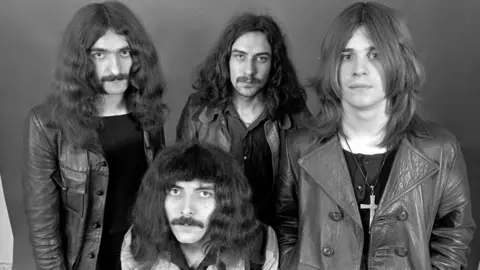 Getty Images
Getty ImagesWith Black Sabbath's final concert just days away, metal bands and musicians explain how the band influenced the course of their lives - and paved the way for a new generation of artists.
"Sabbath gave us the blueprint, Sabbath gave us the recipe. They gave us the cookbook, man," says Slipknot's Corey Taylor.
"The mystique was in the lyrics. It was in the sound. It was in the way that everything was just a little darker."
The song that shares the band's name is "one of the scariest songs I ever heard" says Taylor, which he plays when he "wants to go someplace mentally".
"I don't have to look for, you know, [The Omen's] Damien Thorn. I don't have to look for Mercyful Fate.
"I go back to the beginning. I go back to Black Sabbath, the song and the rest is history."
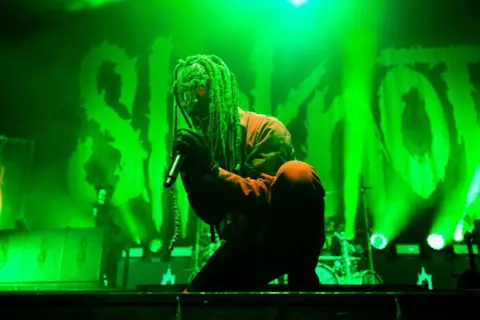 Getty Images
Getty ImagesThe frontman is among musicians paying tribute to the band ahead of their final performance on Saturday.
The all-day Back to the Beginning event at Villa Park in Birmingham on Saturday will feature Metallica, Slayer, Halestorm, Lamb Of God, Anthrax and Mastodon among many others.
Metallica were quick to post a photo of lead singer James Hetfield on what has become the iconic Black Sabbath Bridge.
Halestorm's frontwoman Lzzy Hale says she would not be the singer, songwriter or guitarist she is today without the influence of the band.
"For whatever reason Black Sabbath caught me early on and it was something that I didn't even know how to describe, but I understood it," she says.
Being part of the show "wasn't even on my bucket list of dreams," she adds, "because it was an indefatigable dream to even consider because it was impossible."
Allow Instagram content?
Ozzy Osbourne, guitarist Tony Iommi, bassist Geezer Butler and drummer Bill Ward sold more than 75 million records worldwide.
Black Sabbath, initially called Earth, emerged from a "vibrant music scene" in 1960s Birmingham according to their first manager Jim Simpson.
Setting up Big Bear Records in 1968, he had invited the foursome to play at Henry's Blueshouse at The Crown pub on Hill Street, where they were an instant hit with punters.
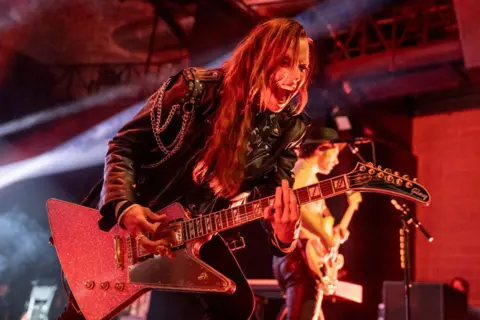 Getty Images
Getty Images"There was much more attention paid to them than the average band," he recalls.
The four started out playing blues, before turning their attention to writing their own material.
The band had initially made a "horrendous racket," adds guitarist Iommi, "but it worked out in the end, it was great."
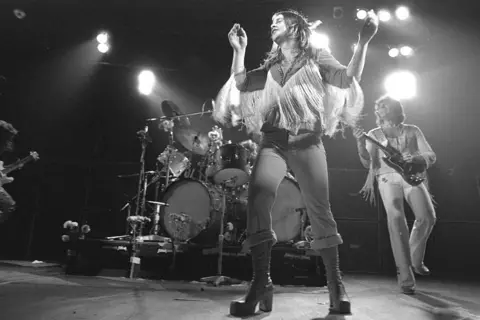 Getty Images
Getty ImagesThey were a "product of the time and a product of the city" says Jez Collins, founder of Birmingham Music Archive.
"I don't think it would have happened from any area other than Aston with all of those foundries and factories and the smelts and the bomb sites," he adds.
Slipknot's Taylor agrees.
"One hundred percent Iowa is the reason why Slipknot was Slipknot and the Midlands are absolutely the reason Sabbath was Sabbath," he says.
"You are where you come from."
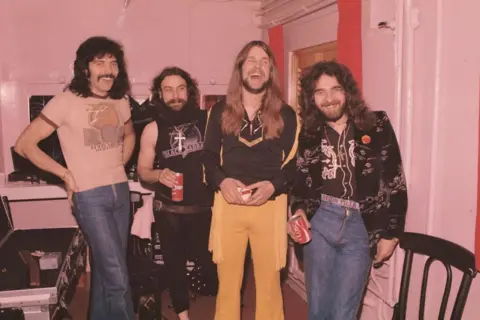 Getty Images
Getty ImagesThe band's distinctive sound, which helped propel them to worldwide success, was partially down to Iommi's earlier job at a steel factory.
Planning to leave work in order to take up a place with another band, he had lost the tips of two fingers on a steel-cutting machine.
"After the accident I went to various doctors and they said 'you'd better pack up really, you're not going to be able to play,'" he says.
"But I wouldn't accept that," he adds, describing how he had fashioned new fingertips from a melted down Fairy Liquid bottle and parts of a leather jacket.
Start of the magic
Judas Priest lead singer Rob Halford, who grew up a few miles away in Walsall, picks up the legendary story.
"When Tony had his accident, and had to detune some of the strings, things started to get lower and heavier, and that's when the magic really started," he says.
"And certainly for me and for all of us in Priest, from day one, those bands and more were a tremendous influence to us all."
Led Zeppelin and Deep Purple were also forefathers of the movement, but it was Sabbath that "cemented it," adds Taylor.
He and other artists have been speaking to BBC Radio WM for a new documentary, Forging Metal, looking at the history of the genre.
Barney Greenway, lead singer of Napalm Death, also from Birmingham, says the "density and the depth of the music they were making was completely new".
"There were bands doing darkly heavy music at the time, but arguably nothing like Black Sabbath.
"Heaviness and musical extremity before that was even thought of," he says.
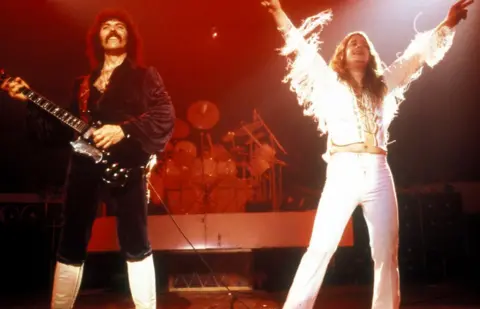 Getty Images
Getty Images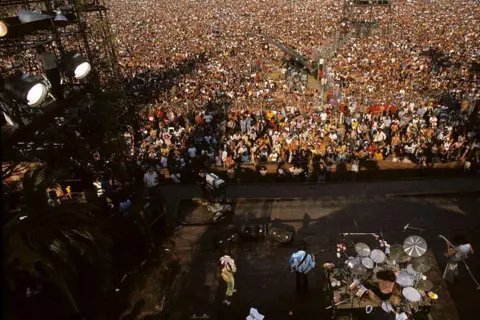 Getty Images
Getty ImagesThe eyes of the world will be on Birmingham for the Villa Park gig which is a "profoundly important centre for metal," says city academic Dr David Gange, author of the Why Metal Matters project.
But, he adds, "metal was global from its origins, with indigenous Americans such as [guitarist and songwriter] Link Wray, and others, particularly from Latin America, being crucial to it's emergence".
Crusty, dirty and glorious
The genre had spawned "literally hundreds of sub genres, probably thousands," he explains, with some now being used to promote social and environmental activism, in far flung corners of the globe.
"There's an absolutely wonderful band in the very, very far north of Finland, called Unearthly Rites, who are as heavy as can be," he says.
"They are crusty, they are dirty, they are just glorious, their key thing is protesting open-pit mining, and their musical heritage runs directly back to Birmingham bands like Napalm Death and Bolt Thrower".
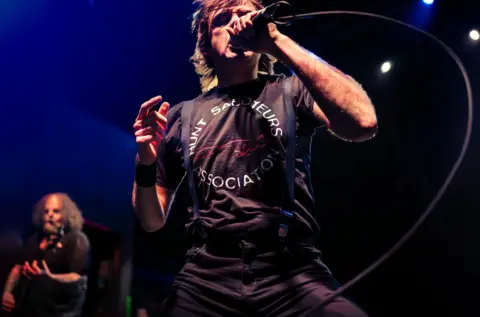 Dr David Gange
Dr David GangeMany of the "most interesting" artists taking metal forward are currently women or non-binary people, the Birmingham University history lecturer added.
Birmingham's Debbie Gough, who fronts metal band Heriot, says the scene is "the most diverse space" she has ever known it to be.
Heriot has just completed its second headline tour of the UK and are about to embark on a 32-date tour of North America supporting "super influential" Trivium.
"I feel very welcome and feel like it's a very accepting space and a very informed space as well which has allowed for lots of different people in bands to experience music," she says.
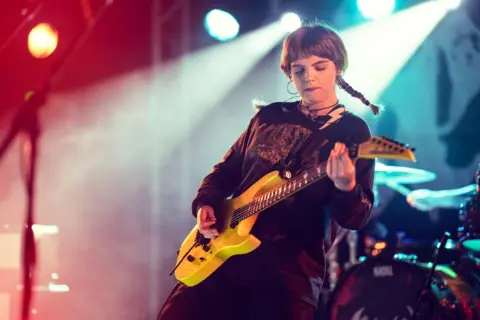 Dr David Gange
Dr David GangeThere had been a marked change since the Covid-19 pandemic, she claimed.
"Before that I could maybe count on one hand the amount of times there had been female crew, or other bands with females on the line-up, and now nobody even flinches, which is super cool.
"I'm just overjoyed about the blueprint of who gets to be in a metal band has just been completely destroyed and anybody can be in any band now - and that's really amazing to see," she added.
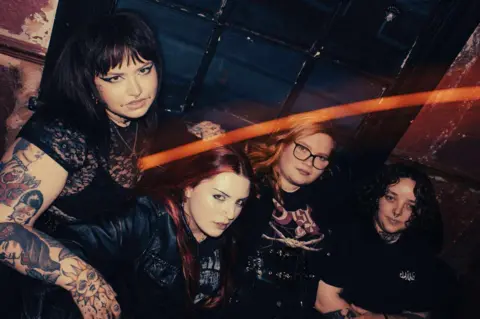 Ziggy Ella Bagley
Ziggy Ella BagleyEmily Drummond, vocalist for the all-female Birmingham band, Cherrydead says she is also "absolutely buzzing" about the future of metal.
"Not just in the West Midlands, all across the UK and it's something that we are so glad to be a part of," she adds.
Cherrydead are among acts playing a BBC Radio WM celebration gig Metal in the Midlands.
She says there had been a "real shift" for women within the scene.
Although not perfect, she added, "there is a transformation coming and I feel things have really moved in that sense".
Mosh pit freedom
The metal scene faces "all kinds of crises", Dr Gange says, with many music venues under threat.
"But metal thrives off crisis, metal is the music for how we process crisis and the bands are doing it in such exciting ways," he adds.
"It's a profoundly supportive community, the mosh pit itself is an allegory for all the best things in life - you give yourself total, total freedom, let yourself fall over, let anything happen with the complete knowledge that someone is going to reach out and pick you up if you go down."
BBC Radio WM's Forging Metal will be available on BBC Sounds from Friday 4 July.
Follow BBC Birmingham on Facebook, X and Instagram. Send your story ideas to: [email protected]
